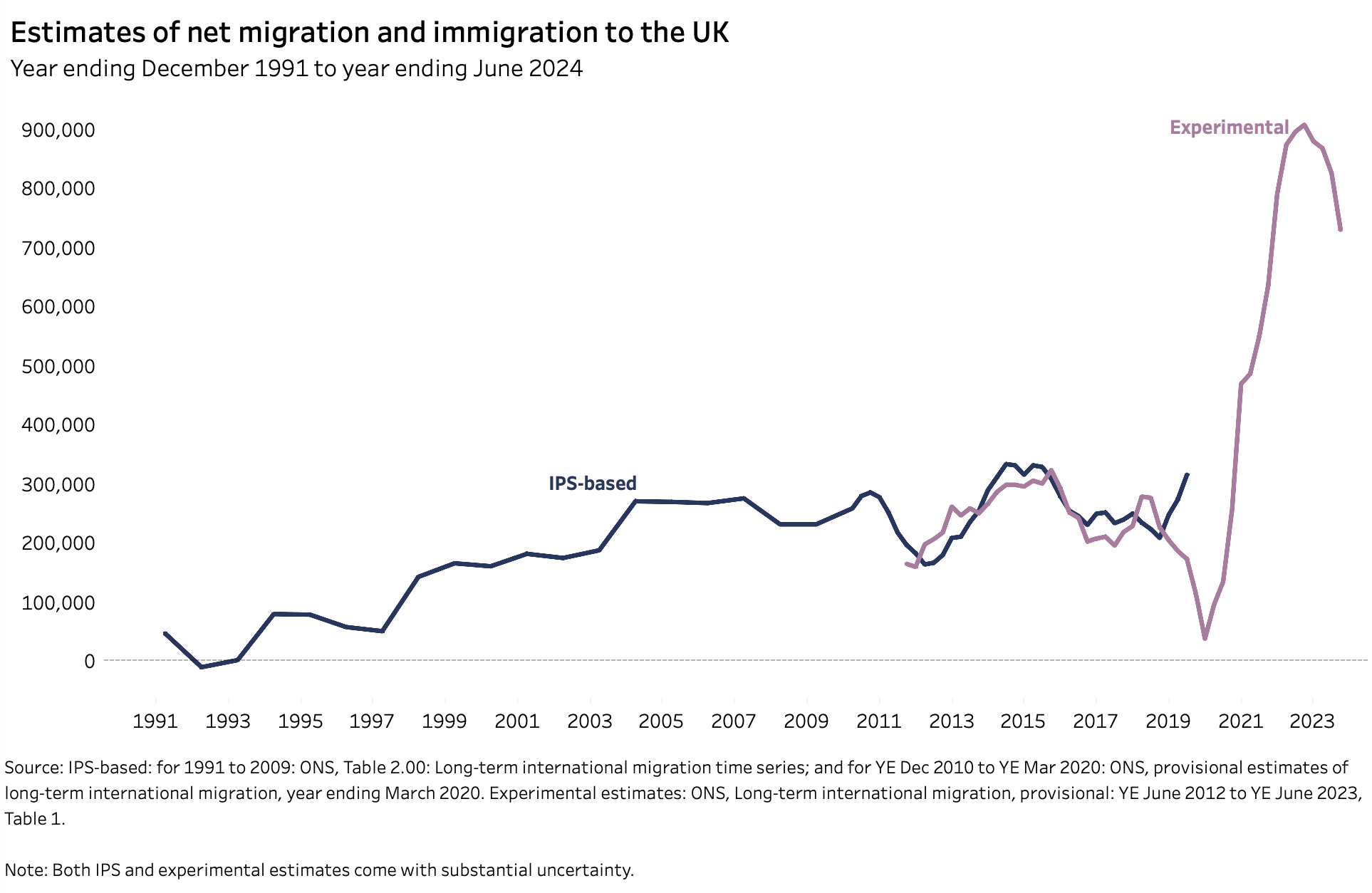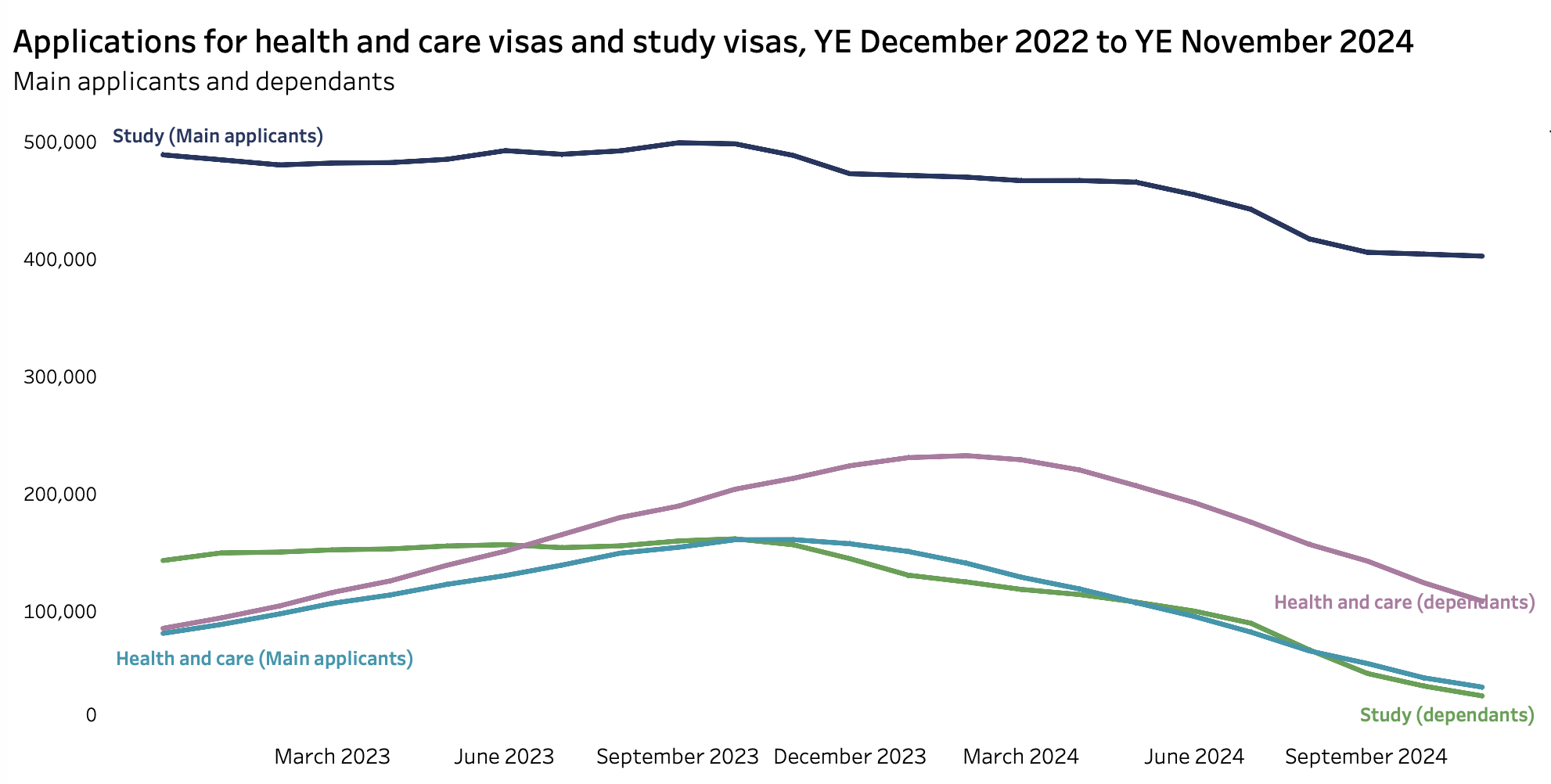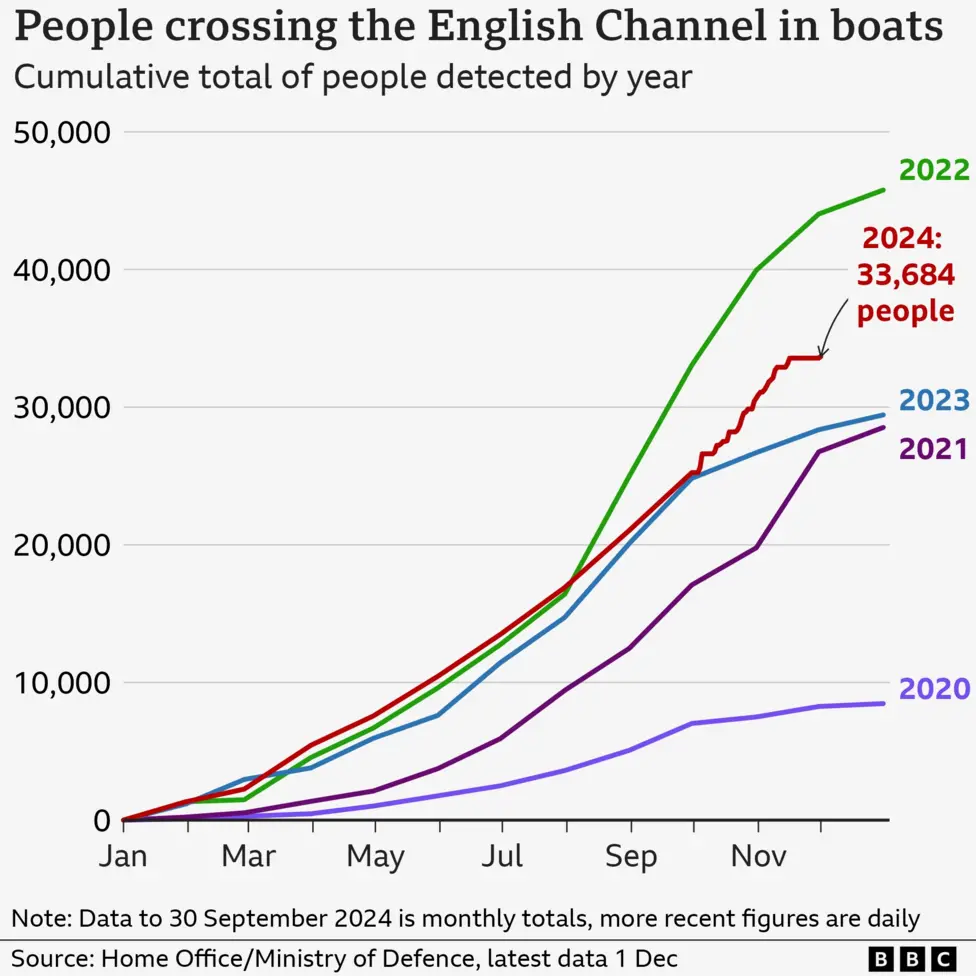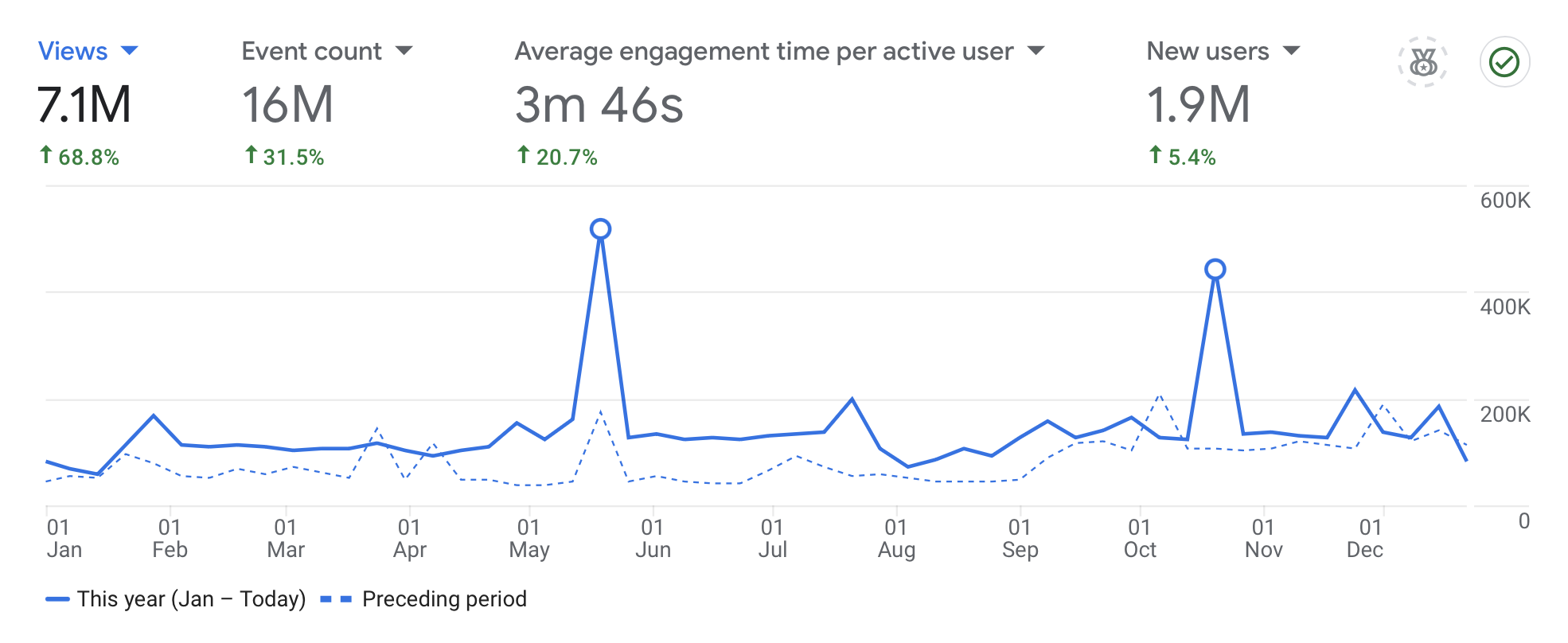- BY Colin Yeo

Free Movement review of the year 2024
Every year I put together a round up of what’s been going on in the immigration world and here on Free Movement over the last year. In last year’s review I predicted that the government would bring the Illegal Migration Act into force and that as a result “the backlog will come back with a vengeance”. That did indeed come to pass, at least in part. I predicted the asylum grant rate would fall, which it has, from a peak of 75% to around 50%. Not a hard prediction to make if you’ve been following the situation, that one. It too has come to pass. I also said the appeals backlog would grow, which it has, dramatically. Small boat crossings do seem slightly up in 2024 compared to 2023 (although still lower than 2022).
Happily, I seem to have been wrong in thinking Braverman’s career might still be a thing in 2024 and that Jenrick might be Shadow Home Secretary. I was also wrong about anyone being sent to Rwanda, I’m very happy to say. I’d predicted at the outset of the scheme that a small number would be sent.
New government
There have been some promising signs from the new government. The Rwanda scheme was immediately abandoned. The asylum backlog is coming down, although it has taken time to undo the damage wrought by the cack-handed partial commencement of the Illegal Migration Act by the previous government. A review of the spouse minimum income requirement was announced. An extended move-on time for newly recognised refugees is being trialled to try and reduce initial homelessness and ease the burden on local authorities.
There have also been what some consider to be worrying signs. The number of removals is apparently up and workplace immigration raids have apparently increased. The government confirmed it would proceed with plans to reopen to closed immigration detention centres. Many Free Movement readers will be uneasy or even horrified by these developments.
I can’t say I’m delighted. But I think increased removals and voluntary departures of failed asylum seekers is necessary if anyone is to have faith that the asylum system is functioning. It’s a grim affair but it’s what happens when we have borders. At the same time, though, I really don’t think workplace raids or an increased detention estate are either necessary or helpful. They may seem ‘tough’ to some but they have probably zero real-world impact on their own other than distracting the government from other more effective activities. This distinction between real and performative immigration enforcement is something I’ve tried to articulate over on my occasional immigration policy Substack.
I’d like to see a rethinking of the whole hostile environment, a move towards proper labour market enforcement where immigration enforcement is incidental, rather than the other way round, far more emphasis on voluntary departures and I’d like to see genuinely minimal and therefore more intelligent use of immigration detention, including by introducing a maximum detention limit. Voluntary departures does seem to have been substantially prioritised but there’s not much apparent prospect of the rest, unfortunately. My perhaps rather optimistic hope is that falling net migration and a more controlled asylum system might create some political space in future.
Immigration policy
2024 was the year that salary thresholds for some skilled worker visas increased from £26,200 to £38,700, the spouse minimum income threshold increased from £18,600 to £29,000, the “Immigration Salary List” replaced the “Shortage Occupation List”, care workers were prevented from bringing their families with them to the UK and the Immigration Health Surcharge was increased from £624 to £1,035 per year.
There were, I think, just two Supreme Court judgments on immigration and asylum issues. In AM (Belarus) v Secretary of State for the Home Department [2024] UKSC 13 the court held a man living in the UK for 26 years had no human right to immigration status because it was his own fault he could not be removed. In CAO (Respondent) v Secretary of State for the Home Department [2024] UKSC 32 the court held the statutory duty to safeguard the best interests of children does not directly apply to the immigration tribunal itself.
And we saw four statements of changes to the immigration rules, consisting of 446 pages of detailed legal changes. Urgh.
Net migration reached an astonishingly high level under the previous government, peaking at 906,000 in the year ended June 2023 before falling to a still-very-high level of 728,000 for the year ended June 2024.

The new government wants to be able to go into the next election pointing to much lower net migration than they inherited. That is going to be a key driver for immigration policy and other aspects of policy for the next five years.
Happily for the new government, net migration is already on a downward trend.
Unhappily for the new government, net migration is already on a downward trend.
The problem is that, as journalist Stephen Bush regularly says, cutting immigration is a spending commitment. Sure, you can reduce international student numbers. But you have to fund universities from domestic sources instead, then, or watch universities (and prospects for economic growth) collapse. Sure you can stop importing poorly paid foreign care workers. But you need to find the money to pay home-grown ones better instead, otherwise the workers in question will get a higher-paid job with Amazon or whoever instead.
The previous government hoped to square this circle by allowing main applicants for key visas but denying them the right to bring dependants. So far, that plan is not working; both main applicants and dependants are falling, as this chart from Migration Observatory shows:

So, the government can reduce immigration. Of course it can: it controls how many visas are issued in what categories. But there is a cost to doing so, and there is little sign the government is willing to find the money.
A White Paper on legal migration is apparently due early in 2025. We’ll get a better idea of what is ahead when we see that.
Asylum policy
The new government, just like the last, is desperate to reduce small boat crossings. It looks like 2022 was the peak in crossings; 2024 crossings will be higher than for 2023 but lower than for 2022, as this chart from the BBC shows:

It is not clear what has caused the number of crossings to fall compared to 2022. Is it reduced demand? If so, is that caused by deterrent policies in the United Kingdom being communicated to potential migrants, who have decided not to bother trying to come here? Or by fewer migrants crossing into the EU either due to higher security or more peace and stability? Or is it more effective policing in France and further afield, by preventing departures from the French shore?
Or is it the weather? A comical recent article in the Times by their chief political correspondent simultaneously reported Labour sources asserting they had broken the link between migrant crossings and good weather while the same sources also attributing an increase in good weather for increased migrant crossings in 2024 compared to 2023. Increasing expectations in provably unrealistic ways is surely not smart long-term politics.
What would genuinely help would be some sort of returns deal with France or the EU. If with the EU, this would presumably be some sort of re-entry into the Dublin system. Major reform to this take effect 2026 which would weight the system even more heavily in favour of countries like the UK but which also include mechanisms for better support of front line countries like Greece and Italy. Several non-EU countries participate in the Dublin system but the system is a kind of byproduct of free movement rules within the single market, so it’s quite hard to imagine the UK could rejoin as things stand today.
But not impossible.
The current French Interior Minister, Bruno Retailleau, is reported recently to have threatened to withdraw from the bilateral 2002 Le Touquet French-UK treaty that allows UK immigration officials to operate in France if some sort of new deal is not reached between the UK and EU. “Eventually, there will have to be a legal [immigration] route to Great Britain and a returns route not only to France but also to the border countries,” he is reported as saying. So it sounds like the current French government is all in favour of a Dublin-like deal, basically. Perhaps there will be some movement on this at some point.
The other big asylum issue is the backlog caused by the slow-down in decision-making by the last government between 2017 and 2022. The initial decision backlog will come down rapidly in 2025. However, the falling grant rate and the sheer volume of decisions will mean (a) a lot of refugees being granted status with short term support needs while they find jobs and accommodation and (b) a lot of appeals being lodged by everyone else. To be clear, the growing appeals backlog is less of a problem than the initial decisions backlog because it includes less people. But it will make it hard to get the costs of the asylum system down in the short to medium term.
Whatever happens with small boat crossings, 2025 will be the year the initial decision backlog is finally cleared. The smaller appeals backlog will persist for at least another two years, though.
Here on Free Movement
We expanded the Free Movement team again this year. We took on a fifth member of staff in May 2024, Rachel Whickman. We have no plans to expand our directly employed team any further at the moment but we are seeking a few new trainers for our month-long introductory and advanced immigration law courses, which we’ve been delivering in-house so far. The team here has been working incredibly hard behind the scenes and this should take the pressure off a little, hopefully.
Google Analytics tells me we received 7.1 million page views over the last year, up nearly 70% on last year. This is a testament to the great work Sonia has been doing as Editor, for which I am incredibly grateful.

There were two big spikes on 22-24 May on the blog post Home Office announces more changes to pre-settled status and 21-23 October on the blog post EU Settlement Scheme: curtailment of pre-settled status after no longer meeting the rules. Here’s the full top ten for 2024:
- Home Office announces more changes to pre-settled status, me, 21 May 2024, 382,072 views
- EU Settlement Scheme: curtailment of pre-settled status after no longer meeting the rules, Nicole Masri, 21 October 2024, 316,212 views
- What are the financial requirements for UK spouse and partner visas?, Jack Freeland, republished 12 April 2024, 222,024 views
- There is no 180 day a year rule for visitors to the UK, John Vassiliou, last republished 11 July 2023, 90,522 views
- High Court finds passport office prevented from refusing passport to person who may not actually be British, Alex Piletska, 24 July 2024, 74,536 views
- “But I don’t know any barristers” – the case for scrapping the referee requirement for citizenship applications, Alex Piletska, 26 November 2024, 66,270 views
- Changes to work visa routes from 4 April 2024 and what it means for employers, Ross Kennedy, 25 March 2024, 66,113 views
- Should refugees claim asylum in the first safe country they reach?, me, republished 20 June 2024, 61,919 views
- Exceptional circumstances in a spouse or partner visa application under Appendix FM, Gabriella Bettiga, republished 12 April 2024, 55,036 views
- Travelling to the UK with (and without) status under the EU Settlement Scheme, Chris Benn, 26 September 2024, 52,887 views
Some of those were new this year, some were updated and republished during the year and some were published earlier than others. Alex Piletska’s call to arms on the referee requirement for citizenship applications was only newly published at the end of November, for example, so has done well to rack up so many views in 2024.
Live training has really taken off this last year thanks to the inspired work Jasmine has done as Training Manager. Our first webinar was in December 2023 and since then, over the course of 2024, we ran 21 webinars or workshops. We see this as another way of trying to get updates, commentary and analysis on immigration and asylum law to our audience and, so far, it’s been going really well. Attendance and feedback has been really positive. We had 170 people turn up for one webinar! The two formats of uncapped webinars and more intimate capped workshops for trickier topics seems to work well too. The workshops sell out well in advance, which means disappointed potential customers, but we have to keep the numbers down to make them work well.
Check out our spring training programme while you’re here…
The live OISC courses have also been going really well and they’ve all sold out even though we’ve been running them more frequently. We ran nine of these in 2024 and we’re planning to run even more of them next year, although the impending rebranding of the OISC to the Immigration Advice Authority isn’t going to help those trying to work out what training to attend and who by. The introductory course is sold out for January but there are places on the separate short exam prep course in February and the full courses in March and April. The advanced course in late January has two places left and we won’t be running that one again until November.
Free Movement membership is up 18% on last year. We now have around 4,400 members, compared to 3,780 at this time last year. That is despite one of our biennial price rises in April, which I’m always nervous about. We have 32,900 email subscribers, which is only slightly up on last year. Over on social media, I gave up on Twitter after Musk’s intervention during the summer riots. I check it occasionally but now use Bluesky instead as @colinyeo.bsky.social, where I’ve built up 19k followers in a fairly short time. I’m confident a pretty high proportion of them are real people who are interested and engaged, unlike over on Twitter. We also have a @freemovement.bsky.social account to which we post blog updates. If you are interested in joining Bluesky, I’ve put together a starter pack of UK immigration law and policy accounts to follow.
Less positively, we’ve been experiencing an ongoing DDoS cyber attack that began during the summer race riots. This has been a pain. The site has only ever been down for a short time but the security measures we have had to take to keep things running have sometimes had knock-on effects which interfere with our workflows and connections to other software services such as social media and emails. It has also increased our hosting and support costs. It has been tapering off since the summer but never completely ending. This has all kept our unflappable Operations Manager, Faye, rather busy.
I want to end with a big public thank you to Sonia, Jasmine, Rachel and Faye at Free Movement, to the many contributors who have written for us, to the trainers who have delivered courses for us and, finally, to Free Movement members for supporting the whole project. It really has been an exceptional year.
SHARE

